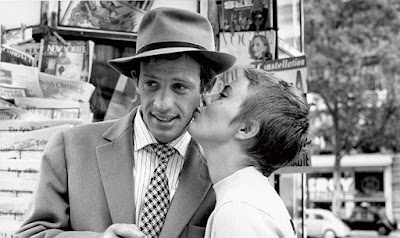By James V. Ruocco
In Sally Potter's acerbic, sharp-witted comedy drama "The Party," seven characters unashamedly bare their souls at a celebratory social function rife with riotous pronouncements, revelations, calamity, drama, sarcasm, shouting, punching and frenzy. And, oh, yes, some well-administered shocks, truths, deceits, surprises and punches guaranteed to knock the popcorn and jelly tots right out of your hands.
Edward Albee, perhaps?
Yes and no.
No doubt, Potter is a fan of the late playwright, but this is not "Who's Afraid of Virginia Woolf?" times seven instead of four. Every now and then, an Albee truism, tick or bite springs to mind but, regardless, this is Potter's show (Sally not Harry) and it's one that delights and cajoles due largely to the story's brilliant sting, its unexpected mayhem and its wild, absurdist cheekiness with a capital C.
This "party" also comes gift-wrapped with an A-list cast of film, stage and television vets ( namely, Kristen Scott Thomas, Timothy Spall, Patricia Clarkson, Cherry Jones, Emily Mortimer, Cillian Murphy and Bruno Ganz). And, its been filmed in black-and-white, an added cinematic bonus which heightens the film's offbeat, quirkiness and serio-comic elements with its use of sharp, pointed, close-ups, edits and glaring lighting effects that often, does not flatter any of the film's participants. Then again, that's probably the point. "The Party" is not about glamour. It's about real people with real lives that are unraveling and falling completely apart.
The title of the film refers to a single night soiree, honoring Janet (Kristen Scott Thomas), Britain's newly appointed shadow health minister, who, when we first meet her, is holding and pointing a gun at the camera, right before "The Party" quickly flashes backwards in time exactly one hour and eleven minutes.
Why is Janet holding a gun?
Has she loss the plot? Is she playing a party game? Is she going to kill herself? Is she going to kill one of her party guests? Or, is it aimed at a last minute arrival? All of that is decided by Potter right before the film's ending. Let's just say, it's one of those plot conceits that you didn't see coming, which, in turn, gives "The Party" its final bombshell of the night. And believe me, there are many.
The setting for "The Party" is a chic, lived-in London, ground-floor townhouse (is there any other?). Here, Janet and her odd-looking, much-older husband Bill (Timothy Spall), anxiously and nervously await their guests. They include Tom (Cillian Murphy), a fidgety, glassy-eyed banker who snorts coke and carries a gun; April (Patricia Clarkson), a sharp-tongued bitch who says exactly what's on her mind regardless of the consequences; Godfrey (Bruno Ganz), her drippy boyfriend; pregnant Jinny (Emily Mortimer) and Martha, her older lesbian partner (Cherry Jones).
If you've seen Albee's "Who's Afraid of Virginia Woolf?" or Potter's "Ginger & Rosa," then you already know something's amiss. It's just a matter of when and how it will all play out as Potter pulls out all the stings, slaps, punches and rows that punctuate parties and guides her strategically placed seven characters through a verbal ping pong match of sarcasm and wit that never once stops dead it ins tracks. As director, she knows exactly how "The Party" is to play out, frame my frame, scene by scene, close up by close up, zinger by zinger and shock by shock. No one escapes her wrath. Everyone is suspect to guilt, desire and deceit. Some will lose. Some will win. And then, there is that gun. Bang! Bang! Bang!
Although "The Party" is set in modern day London, there's a definitive, purposely retro look to the proceedings that recalls and pays homage to British films of the 1960's. The cuts, the edits, the pauses, the close ups, the long shots and the over head glimpses of the characters are smartly dictated by Potter and superbly augmented by Russian cinematographer Aleksei Rodinov. In fact, things are so convincing, one expects a very young Laurence Harvey, Sarah Miles, David Hemmings, Albert Finney, Shirley Anne Field, Rita Tushingham or Tom Bell to walk into the room at a moment's notice. Back in the day, any one of them could have played a key role in a film of this genre.
The always-wonderful Kristen Scott Thomas brings plenty of class, poise and admirable unexpectedness to the part of Janet. She plays the part. She loves the part. She owns the part. And she does it all ever so beautifully using that same sort of compassion, depth and honesty that has categorized her work in everything from "Darkest Hour," "Gosford Park" and "The English Patient" to "Suite Francaise" and "Angels and Insects."
Timothy Spall is wonderfully catatonic and hilariously off-balance, which is exactly what the part of Bill calls for. Patricia Clarkson is deliciously wicked as April, Janet's best friend and confidante who trades insults and compliments mostly in the same sentence. As her sidekick Gottfried, Bruno Ganz is appropriately silly especially when blathering on and on about karma and the joys of alternative medicine. Cherry Jones' Martha is a commanding force to be reckoned with. Emily Mortimer is positively perfect as her young companion Jinny. And Cillian Murphy's jittery, coked-up Tom is sinfully fucked up in every way imaginable.
"The Party" is an exuberant, smart, satisfying entertainment. Clocking in at a mere 71 minutes, it never once disappoints or overstays it welcome. It is a refreshing, ambitious achievement, offset by a marvelous cast who have great fun with Potter's mad story, its barbed dialogue, its expressive irony and its ability to shock and surprise in ways that you never saw coming.
"The Party" stars Kristen Scott Thomas, Timothy Spall, Patricia Clarkson, Cherry Jones, Emily Mortimer, Cillian Murphy and Bruno Ganz. Written and directed by Sally Potter. Rated R. Running time: 1 hr. 11 min. (Picturehouse Entertainment/Roadside Attractions)









No comments:
Post a Comment